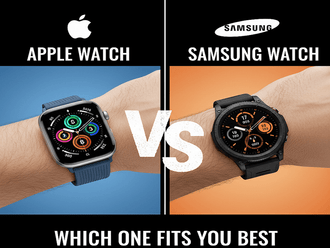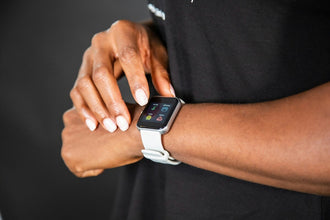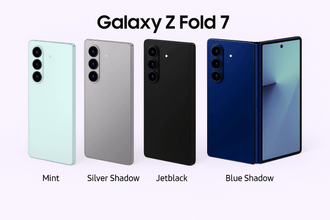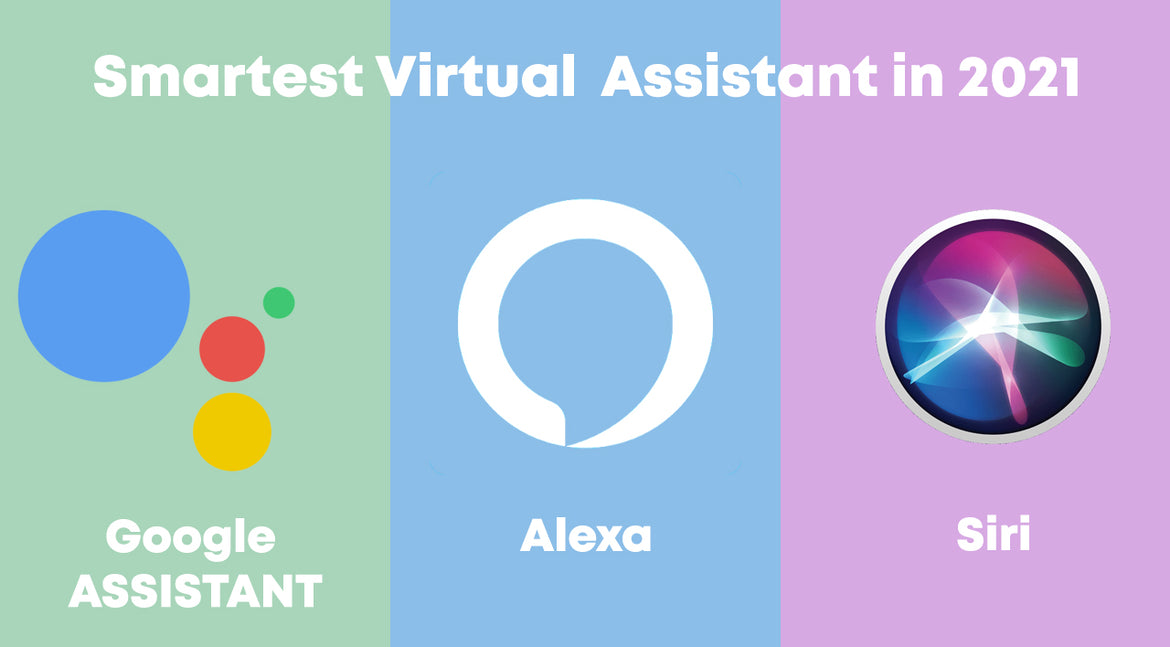
Alexa vs Google vs Siri: The Smartest virtual assistant in 2021
- 12 Feb, 2021
Introduction
Personal assistant is a software technology capable of performing tasks based on the user’s verbal commands. In the past few years, personal assistants such as Apple's Siri, Amazon's Alexa, and Google Assistant have become the most prominent and best smart virtual assistants out in the market right now. Personal assistants are not only on smart home speakers, but you can also find them on devices such as phones and tablets. While all of them offer pretty much the same, each assistant has its own set of strengths, weaknesses, and features. So, which one is the best smart virtual assistant according to your needs amongst the options? Read below to help you find the answer.
Who possesses more knowledge among the three?
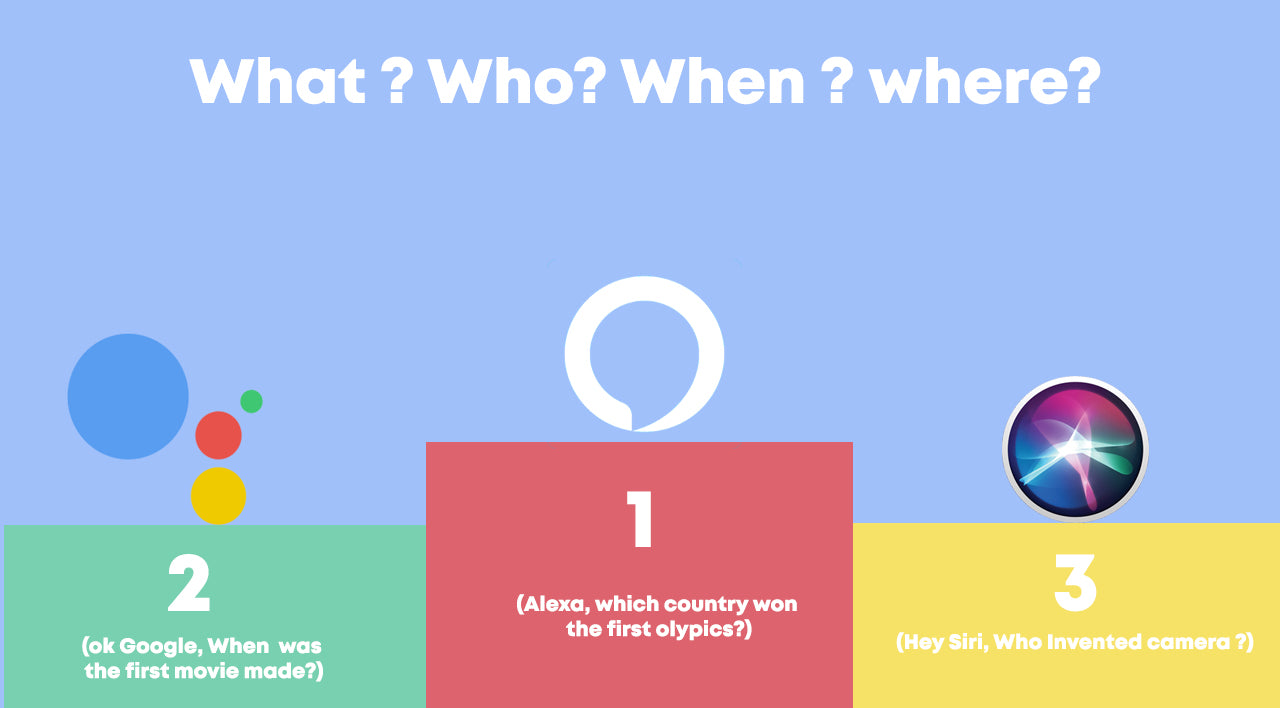 In terms of general knowledge, Alexa overpowers Google Assistant as it provides additional context beyond the plain answer of the questions. Though attempts say that it failed on a few questions, the answers from both Alexa and Google Assistant were generally spot on, requiring little rephrasing and rarely forcing users to ask more than once. The results from Google Assistant were also pretty similar to those from Alexa and provided good, fast contextual responses. As far as Siri is concerned, it did the worst in this arena. Apple said that its assistant is not designed to answer questions about trivia.
In terms of general knowledge, Alexa overpowers Google Assistant as it provides additional context beyond the plain answer of the questions. Though attempts say that it failed on a few questions, the answers from both Alexa and Google Assistant were generally spot on, requiring little rephrasing and rarely forcing users to ask more than once. The results from Google Assistant were also pretty similar to those from Alexa and provided good, fast contextual responses. As far as Siri is concerned, it did the worst in this arena. Apple said that its assistant is not designed to answer questions about trivia.
Rankings:
1.Alexa
2.Google Assistant
3.Siri
Who handles maps the best?
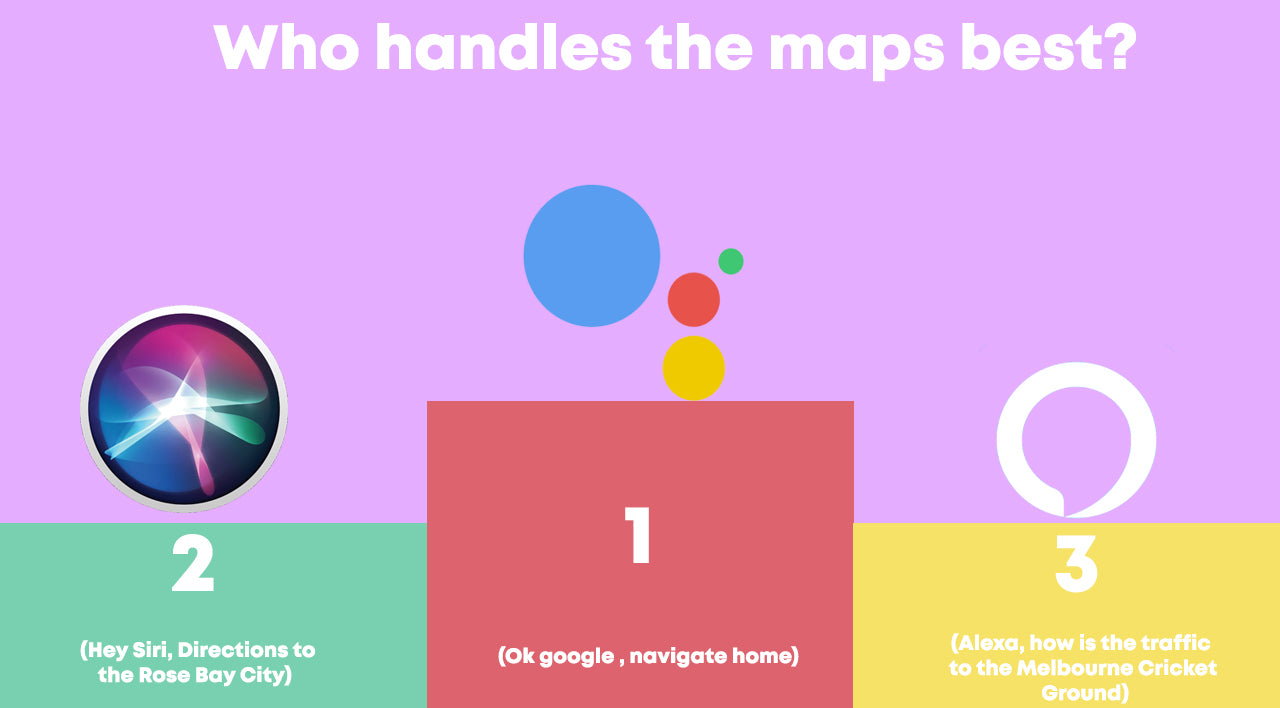 While leaving the house, one may use virtual assistants for directions. Siri does very well with instructions on the iPhone by not only giving a sense of how long it will take you to get there, but also offer directions and start GPS navigation automatically. Although Siri can also get transit directions, it’s average at answering traffic questions, because it only kicks you into the app for iOS Maps. Furthermore, Siri can give you an estimation of time and a recommendation of a major route on the HomePod, but it can't send directions to your phone, either automatically or on request. It can't take directions for public-transit either but is honest about traffic conditions.
While leaving the house, one may use virtual assistants for directions. Siri does very well with instructions on the iPhone by not only giving a sense of how long it will take you to get there, but also offer directions and start GPS navigation automatically. Although Siri can also get transit directions, it’s average at answering traffic questions, because it only kicks you into the app for iOS Maps. Furthermore, Siri can give you an estimation of time and a recommendation of a major route on the HomePod, but it can't send directions to your phone, either automatically or on request. It can't take directions for public-transit either but is honest about traffic conditions.
Coming to Google Assistant, it wins this section. In most cases, not only does it have solid time estimates, but it was also the only one that could navigate public transportation at all, one of the most important features. It also offers an overview of the region's traffic conditions, and can submit directions on the phone to the Google Assistant app, where navigation from Google Maps or Apple Maps is quick to start. Lastly, Alexa stands at the bottom. The directions of the AI to local locations are rational, but are incapable of handling public transit.
Rankings:
1.Google Assistant
2.Siri
3.Alexa
Music and Entertainment
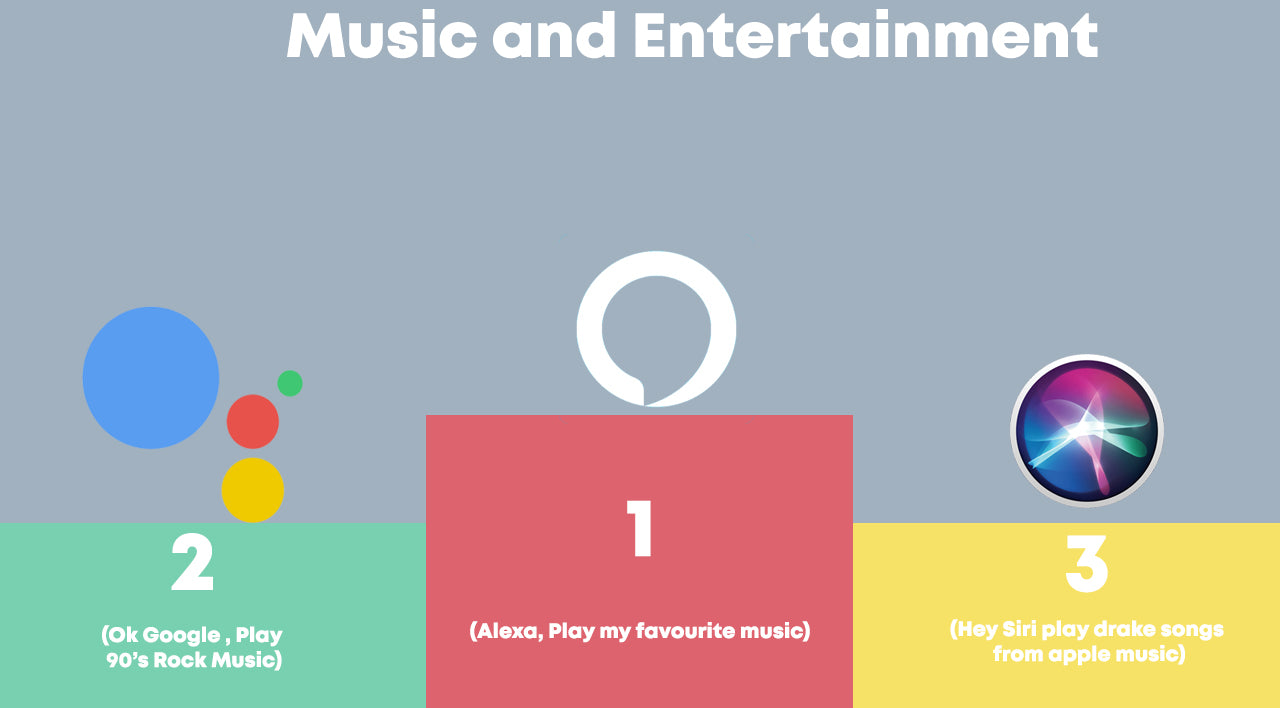 One of the coolest attributes of virtual smart assistants is integration with home entertainment systems. You can monitor your Amazon Fire TV, Fire TV Stick or Fire TV Version with Alexa. Similarly, Google can also monitor playback on Chromecast-connected devices but only provides a few services.
One of the coolest attributes of virtual smart assistants is integration with home entertainment systems. You can monitor your Amazon Fire TV, Fire TV Stick or Fire TV Version with Alexa. Similarly, Google can also monitor playback on Chromecast-connected devices but only provides a few services.
Due to a recent software update, you can use Siri on your iPhone or HomePod to monitor music and podcast playback on an Apple TV or other AirPlay speakers but can’t control any other functions. The latest line of Apple TVs has built-in Siri offering you the chance to do much more. For instance, if you use the assistants to order movie tickets, it ends up being a lot more work on some of the platforms than using the traditional way of booking via a web browser. Alexa offers Atom Tickets which can be sluggish but when you resume later, it lets you pick up where you left off which is not seen elsewhere.
Google Assistant could likewise handle requests for showtimes at nearby theaters, but sent the user back to the phone to complete the purchase. Though Google's approach is certainly an improvement on the state of the art, virtual assistants need work to seamlessly to purchase tickets by voice.
Rankings:
1.Alexa
2.Google Assistant
3.Siri
Devices they work upon
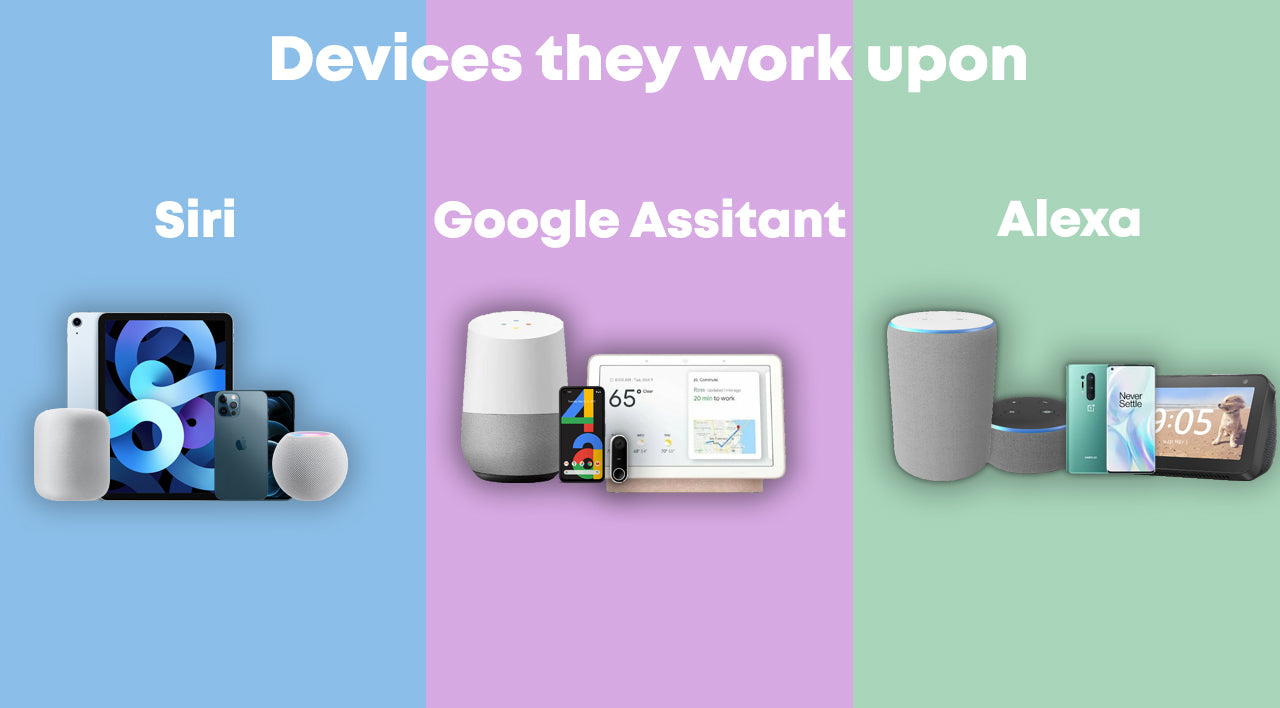 While Siri is limited to the ecosystem of Apple, Google Assistant can be used on both Android and iOS devices. But, the experience on iOS might be slightly poor compared with Android as the former does not allow the users to change the default assistant. Alexa, however, can only be used on an Android smartphone and the iOS Alexa app is only used for connecting to Echo devices.
While Siri is limited to the ecosystem of Apple, Google Assistant can be used on both Android and iOS devices. But, the experience on iOS might be slightly poor compared with Android as the former does not allow the users to change the default assistant. Alexa, however, can only be used on an Android smartphone and the iOS Alexa app is only used for connecting to Echo devices.
Remember, if you have an Android or iOS phone, you can download the Google Assistant app and Alexa app from the App Store or Google Play Store.
Rankings:
1.Google Assistant
2.Siri/Alexa
Verdict: Which personal assistant wins?
So, which one is the best smart virtual assistant? Well, as always, there's no one simple solution to this and the answer depends on what you're looking for to meet your needs.
In our opinion, Google Assistant is incredibly impressive. It can handle several inquiries at once, customize results, and has the power of Google search behind it, making the results super accurate and trustworthy. However, the wake words are not compatible with as many apps and services as Alexa in Google Assistant.
Second, Amazon Alexa is not as dynamic or smart as Google Assistant, but it is compatible with hundreds of thousands of services and applications, the Alexa wake word is personal, and customizable has features like Alexa Calling.
Lastly, Apple’s Siri is the smartest personal assistant, one which allows you to speak naturally and offers features like Siri Shortcuts that make getting things done quick and easy. But it is tied to just Apple devices and offers less compatibility with apps and services as compared to the other two assistants.
So, we can see that each personal assistant has its own pros and cons. If you are looking for the smartest, Google Assistant is your answer. If you want compatibility with apps and services, Alexa is the way to go. If you want the funniest, you'll want an Apple device for Siri without any doubt.

